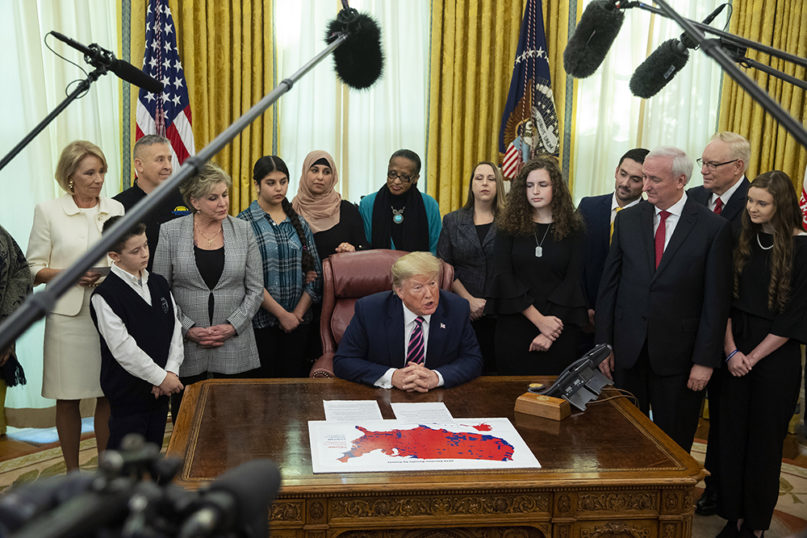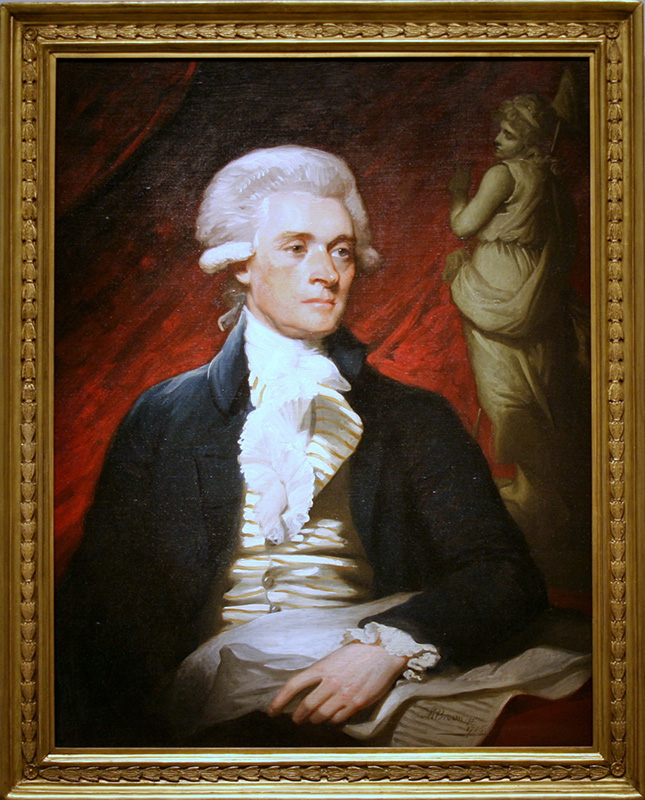(RNS) — In case you missed it, Thursday was National Religious Freedom Day, which is celebrated on Jan. 16 to mark the date in 1786 when the Virginia General Assembly passed Thomas Jefferson’s Statute for Religious Freedom. That statute, which Jefferson considered one of his three crowning achievements (along with the Declaration of Independence and the University of Virginia), disestablished the Anglican Church in Virginia and set the stage for the establishment clause in the U.S. Constitution’s First Amendment, as well as the Article 6 ban on religious tests for office.
So there is a certain irony in President Donald Trump’s using the day to push in the opposite direction.
In an Oval Office photo op with schoolchildren, Trump, reading from a prepared text, declared, “This afternoon, we’re proudly announcing historic steps to protect the First Amendment ‘right to pray’ in public schools.”
Actually, not so much.
The “Guidance on Constitutionally Protected Prayer and Religious Expression in Public Elementary and Secondary Schools” released by Education Secretary Betsy DeVos was essentially identical to the “Guidance on Constitutionally Protected Prayer in Public Elementary and Secondary Schools” put out by George W. Bush’s Education Department in 2003 — which in turn was much the same as “Religious Expression in Public Schools: A Statement of Principles,” which the Clinton education department promulgated in 1995 and updated in 1998.
Principle 1, first laid down in the school prayer and Bible reading cases of the early 1960s, is that the Constitution (in the words of the Trump guidance) “forbids public school officials from directing or favoring prayer in their official capacities.” Principle 2, specified in various subsequent decisions, is that students and teachers get to exercise their free exercise and speech rights in a school setting so long as they do so in ways that do not violate Principle 1.
These principles can fairly be considered Jeffersonian. For over half a century, however, religious conservatives have assailed the prayer and Bible-reading decisions for “kicking God out of the public schools” and have looked for ways of getting around them.
In 2000, the Supreme Court ruled in Santa Fe Independent School District v. Doe that a Texas school district’s arrangement for student-led prayers at high school football games was unconstitutional because it involved both perceived and actual government endorsement of the delivery of prayer at important school events. A year ago, the Supreme Court declined to review an appeals court decision upholding the dismissal of a Washington state football coach who was fired for leading players in prayer on the field after games.

President Donald Trump speaks during an event on prayer in public schools, in the Oval Office of the White House, on Jan. 16, 2020, in Washington. (AP Photo/ Evan Vucci)
In his remarks, Trump lamented that “in public schools around the country, authorities are stopping students and teachers from praying, sharing their faith or following their religious beliefs. It is totally unacceptable. You see it on the football field.” That last sentence was a nice little dog whistle for the prayer endorsement crowd.
As empty of new legal substance as Trump’s claim of “historic steps” was, another Religious Freedom Day announcement from the Trump Justice Department has real consequences. This relates to rules governing faith-based organizations that receive government funding to provide social services.
During the Obama administration, it was decided that such FBOs would have to refer clients who objected to their religious character to alternative providers. So if, for example, an evangelical Christian objected to receiving drug counseling at an Islamic FBO, the FBO would have to refer her to another provider. According to the proposed rule change, it would no longer have to do so.
According to advocates of the Trump position, this will put FBOs on the same footing as secular nonprofits, which don’t have to make such referrals. Thus the conservative Liberty Counsel supports the rule change as being in line “with recent Supreme Court precedent regarding nondiscrimination against religious organizations.”
Which misses the whole point.
The Obama rule was designed to permit government funding of faith-based service providers in a way that respects the religious scruples of those who want no part of the providers’ faith. Strict separationists might object to this compromise, but it does at least make a bona fide gesture toward the establishment clause.
As far as secular service providers are concerned, they need not be under the same obligation precisely because they are secular. Their provision of government-funded services can no more be objected to on religious grounds than any other government-provided service.
Remember Jefferson? His Virginia statute states that no one shall “be compelled to frequent or support any religious worship, place, or ministry whatsoever, nor shall be enforced, restrained, molested, or burthened in his body or goods, nor shall otherwise suffer on account of his religious opinions or belief, but that all men shall be free to profess, and by argument to maintain, their opinions in matters of Religion, and that the same shall in no wise diminish, enlarge or affect their civil capacities.”
Making clients frequent faith-based service providers that are supported by tax dollars without having the right to an alternative provider will cause some of them to suffer on account of their religious opinions or beliefs. In other words, the Trump rule change, proposed on Religious Freedom Day, is nothing less than a violation of religious freedom.






